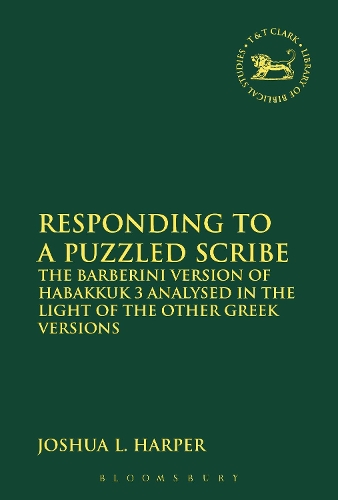
Responding to a Puzzled Scribe: The Barberini Version of Habakkuk 3 Analysed in the Light of the Other Greek Versions
(Paperback)
Available Formats
Publishing Details
Responding to a Puzzled Scribe: The Barberini Version of Habakkuk 3 Analysed in the Light of the Other Greek Versions
By (Author) Rev. Joshua L. Harper
Bloomsbury Publishing PLC
T.& T.Clark Ltd
1st October 2016
United Kingdom
Classifications
Tertiary Education
Non Fiction
Criticism and exegesis of sacred texts
Old Testaments
224.9506
Physical Properties
Paperback
336
Width 156mm, Height 234mm
467g
Description
In part one of this book Joshua L. Harper is able to demonstrate the following aspects of the Barberini version: when compared with the other Greek versions, it appears that the Barberini version was originally independent of the Septuagint but has been influenced by it in transmission. The Barberini version was probably translated no earlier than the later books of the Septuagint (that is, around the first century BC), and no later than the mid-third century AD. The style, methods of translation, and exegetical affinities suggest that the translator was primarily concerned with producing stylistic, understandable Greek rather than with conforming closely to the Hebrew source text. The translator was probably Jewish, particularly since some readings resonate with Jewish exegetical traditions. The relatively polished Greek suggests that the translator had received some formal Greek education, perhaps in a Hellenistic Jewish community. In the second part of this work Harper provides text, translation, and notes for the major Greek versions. The Barberini version has been analysed in particular detail, with regard to lexical and syntactical translation technique, as well as matters of style.
Reviews
Individual text witnesses are presented in detail, and this is the particular value of the work. * Zeitschrift fr die alttestamentliche Wissenschaft (Bloomsbury translation) *
Author Bio
Joshua L. Harper is Lecturer in Old Testament and Biblical Languages at Africa International University, Nairobi, Kenya.
